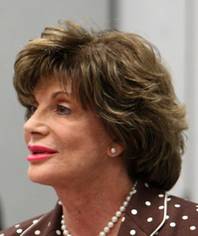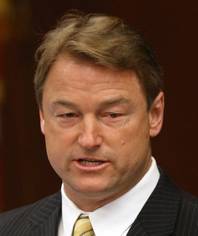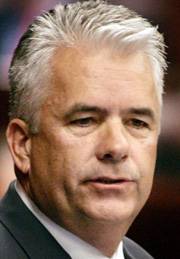Friday, April 15, 2011 | 2:01 a.m.

Shelley Berkley

Dean Heller

John Ensign
Sun coverage
Sun archives
- Rep. Shelley Berkley enters race for U.S. Senate (4-14-2011)
- Lively primary race shaping up for Dean Heller’s House seat (3-16-2011)
- Heller announces for Senate, takes shots at Obama, TARP and spending (3-15-2011)
- Heller preparing for Republican primary in U.S. Senate race (3-15-2011)
- As Berkley eyes Ensign’s Senate seat, Legislature sharpens redistricting knife (3-13-2011)
- Hearings begin on Nevada redistricting (3-10-2011)
- John Ensign will retire after term to avoid ‘exceptionally ugly’ campaign (3-7-2011)
- Even before first redistricting plan is presented, Democrats make first legal move in Carson City court (2-24-2011)
- Dean Heller’s message: Senate seat is mine to lose (2-16-2011)
- Rep. Dean Heller takes poll, leads Sen. John Ensign by 15, inches closer to announcement (2-15-2011)
- Way political maps are drawn leaves some constituents isolated (1-16-2011)
- Battle taking shape over redrawing state’s political map (12-22-2010)
- GOP blames gerrymandering for Democrat hold on Legislature (8-26-2010)
- Upcoming redistricting battle likely to boost Southern Nevada’s influence (7-25-2010)
The race to replace outgoing Sen. John Ensign’s seat is all but locked in for 2012, following Rep. Shelley Berkley’s announcement Thursday that she would run.
“This race is about a clear choice for Nevada’s future,” she said in her formal announcement. “While Dean Heller is proudly fighting on behalf of the Tea Party to dismantle Medicare and Social Security and protect corporations that ship American jobs overseas, I will continue working on behalf of Nevada’s middle-class families by creating good-paying jobs and keeping our promises to seniors.”
The primaries are more than a year off, but Berkley’s decision largely renders them superfluous: Her announcement will likely keep other serious Democratic challengers, such as state Attorney General Catherine Cortez Masto, from entering the race. Cortez Masto has said that she would not consider a bid unless Berkley passed.
Berkley said she suspects her rumored challengers “will all be very supportive of my decision.”
There’s a similar dynamic in the Republican ranks: After Heller announced his candidacy last month, expected challenger Lt. Gov. Brian Krolicki, along with Gov. Brian Sandoval, closed ranks, sending the message that a primary fight would hurt the party’s chances of holding the seat.
Berkley seems to have already secured the blessing of the national Democratic campaign apparatus.
"Our polls show her up and winning," Democratic Senatorial Campaign Committee Chairwoman Patty Murray told reporters at a briefing in Washington. The committee had traveled to Nevada in recent months to meet with other potential Democratic candidates, making Murray's endorsement even more final.
Berkley’s campaign released internal polling last month that showed the congresswoman beating Heller in a head-to-head Senate matchup by about 4 points.
But Heller’s internal polling from a few months earlier showed that he would best Berkley by double digits.
The National Republican Senatorial Committee leapt on Berkley on Thursday, criticizing her as a “rubber-stamp liberal vote” and making a point to not acknowledge her as the candidate to beat.
“Shelley Berkley’s candidacy highlights the choice Nevadans will have in this Senate campaign between yet another big-government, tax-and-spend liberal and a fiscally responsible Republican,” National Republican Senatorial Committee spokesman Brian Walsh said. “If Congresswoman Berkley does survive what is sure to be a very expensive primary, she will have a very tough time selling mainstream Nevadans on her rubber-stamp support for higher taxes, more spending and a record debt, at a time when Nevadans are focused on creating jobs and growing the economy.”
Senate Majority Leader Harry Reid, chief kingmaker in the Nevada Democratic Party, also offered his support to Berkley, calling her a “visionary with a commitment to creating jobs, protecting programs seniors count on and getting our economy back on track.
“Shelley has been a dependable partner in the House and I look forward to her partnership in the Senate as we work together to move Nevada forward,” Reid said.
Still, Berkley will face one well-funded primary opponent: attorney Byron Georgiou, who has so far put $500,000 of his own money into his campaign, raising a total of $1.1 million in the first quarter. Unless party leaders can convince Georgiou otherwise, Berkley will be forced to spend money to win the primary before facing Heller in the general election.
If the race between Berkley and Heller proceeds as expected, voters will see the sharp contrasts in their styles as candidates, political bases and votes on issues before Congress.
Berkley has backed President Barack Obama’s stimulus and health care initiatives; like most other Republicans, Heller hasn’t. Heller’s also given his preliminary support to the fiscal 2012 budget proposal that would turn Medicare into a subsidized voucher and block-grant program and reduce state Medicaid funding; Berkley’s taken every possible opportunity to rail against it.
They’ve broken from their parties at similar junctures too. Unlike most Republicans, Heller voted against the budget compromise that Republican and Democratic leaders struck late last week to avoid a government shutdown; Berkley supported it, which was what a minority of Democrats did in the House.
Compared with most House Democrats, Berkley has been conservative on taxes: She wants to eliminate Bush-era tax cuts for the wealthy, in keeping with Obama’s position; but last December, she was the House Democrats’ loudest voice advocating for reductions in estate taxes. Heller supports lowering taxes on all fronts.
Then, there’s the geographic differences. Berkley and her district are firmly rooted in Las Vegas, while Heller’s foothold is in the broader, more rural north. Berkley has made several pre-campaign trips to parts of Heller’s district in the past few months to introduce herself to voters; Heller’s challenge remains making himself better known to Las Vegas-area voters.
Finally, there are personal differences. Berkley is small but her style is big, intense, and at times, flashy; by comparison, Heller’s height is belied by a more laid-back style.
None of that has been too visible because so far their campaigns haven’t moved much past news releases. Once they start, there’s bound to be tangible differences of approach: Berkley embraces media attention, Heller regularly eschews it.
On Thursday though, Heller released this statement in response to Berkley’s announcement, in which he didn’t really acknowledge Berkley as an opponent.
“This race is about the future of Nevada and our country,” he said. “Do we continue down the same path that led to record unemployment, high gas prices and maintains the status quo, or do we chart a new direction that makes government accountable and responsible to the people? There is no doubt that this will be a tough race regardless of who enters it, but I look forward to the challenges that lie ahead.”
But even if their official statements are noncommittal, Republicans seem to have the same mind-set about this election as Democrats: The field is set, so let the games begin.
“I think (Berkley) is likely to be the Democrats’ nominee,” NRSC Chairman Sen. John Cornyn told the Las Vegas Sun. “So you’ll hear more from us on that as we go.”
That’s an awfully long campaign calendar for a race that seems so locked in place.
Heller’s declaration was rushed by Ensign’s decision in early March to withdraw from the 2012 race. Heller, who had been indicating he wouldn’t make his decision until midyear, declared his Senate intentions a week later.
Similarly, Berkley had been saying she wouldn’t announce her decision until early summer. But the political climate created by the budget debates, which have highlighted contrasts between herself and Heller, was enough to bring Berkley to a conclusion Thursday.
That the DSCC, and Reid, who had been cagey about their preferred candidates to this point, came out with such emphatic endorsements of Berkley before the primary field has even been cleared hints at how important this race is to both parties.
Democrats hold the Senate by a slim majority of three seats — two of which are held by independents who caucus with the Democratic Party. In 2012, 23 of the 53 Democrat and Democrat-leaning independent seats in the Senate are coming up for election, compared with just 10 seats held by Republicans.
So if it’s close, the difference between a Democratic and a Republican majority — and the difference between Reid losing or keeping his job as majority leader — could come down to the Berkley-Heller race.

Join the Discussion:
Check this out for a full explanation of our conversion to the LiveFyre commenting system and instructions on how to sign up for an account.
Full comments policy